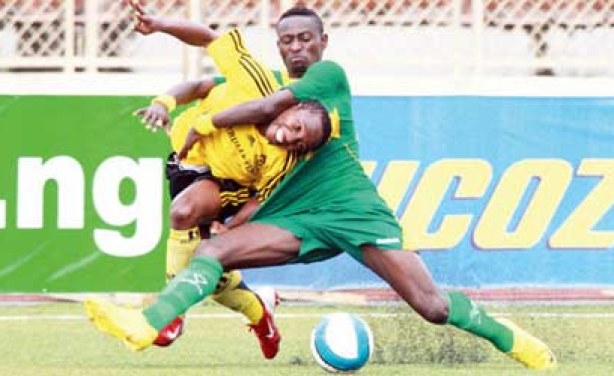When Brought Soccer To Nigeria? History Of Soccer In Nigeria
페이지 정보

본문

A massive 67% of Nigerians see Football, which shows how much the sport affects Nigerian culture. Football's journey in Nigeria began over 100 years back, forming the country's sporting landscape.
Football in Nigeria dates back to the early 1900s. British colonisers brought the sport to the country in 1904. The first taped football match happened that very same year, beginning Nigeria's rich footballing history.
By 1950, Football had actually ended up being Nigeria's nationwide game. Its fast increase resulted in many clubs and associations forming in the early 1900s. This development boosted Nigerian pride and helped motivate political liberty motions.
Nigeria's football tradition now reaches beyond its borders. Over the years, the nation has produced first-rate talent, and Nigerian youth teams have actually won the FIFA U-17 World Cup 5 times.
The Super Eagles, Nigeria's national team, are a force in African Football. They typically qualify for significant tournaments and make their mark internationally.
The British Colonial Introduction of Football to Nigeria
Football arrived in Nigeria during the British colonial age. It quickly captured the hearts of residents, marking the start of a rich footballing tradition in the nation.
The First Football Match in 1904
The first football match in Nigeria occurred in June 1904. It was in between Hope Waddell Training Institution and the team of HMS Thistle. The Nigerian group won 3-2, triggering a nationwide enthusiasm for the sport.

Hope Waddell Training Institution vs HMS Thistle
I hope the Waddell Training Institution in Calabar played a crucial role in early Nigerian Football. Their triumph over HMS Thistle's crew showed the talent of Nigerian players. This match set the stage for Football's development in the nation.
Early Football Club Formation (1906-1932)
After the 1904 match, Football's popularity skyrocketed. From 1906 onwards, early football clubs started forming, and this grassroots motion spread out the sport throughout Nigeria.
The Lagos District Amateur Football Association (LDAFA) was developed in 1932. The LDAFA marked the start of organised Football in Nigeria and paved the way for the sport's future success nationally and globally.
Who Introduced Football in Nigeria
Football showed up in Nigeria in the early 20th century. British colonisers brought this cherished sport to the West African country. It quickly became a passion undeniable that football shaped Nigeria's sporting landscape for generations.
Function of British Colonisers
British colonisers played an important function in Nigeria's football history of football in nigeria. The very first tape-recorded match occurred in June 1904. Hope Waddell Training Institution faced the crew of HMS Thistle.
The Nigerian group won 3-2. This success marked the start of an abundant football tradition in the nation.
Formation of First Football Association
The Lagos District Amateur Football Association (LDAFA) was established in 1932. It prepared for organised Football in Nigeria, which paved the way for the Nigerian Football Association (NFA).
The NFA was founded in 1945. It ended up being the national governing body for Football and manage its advancement throughout the nation.
Development of Local Football Culture
Football quickly settled in Nigeria, ending up being the national sport by 1946. Its accessibility and basic guidelines helped it spread quickly. Regional communities accepted the game, forming their groups.
This grassroots enthusiasm laid the structure for Nigeria's future success. The nation's enthusiasm for Football grew, causing achievements on the worldwide stage.
"Football ended up being more than just a sport; it evolved into a vital Nigerian culture and identity aspect."
The British colonisers' introduction of Football triggered a sporting transformation in Nigeria. Football's journey mirrored the nation's development from the very first match in 1904 to the formation of the NFA in 1945.
Today, Football stays an important part of Nigerian life. It's a testament to the sport's enduring appeal and cultural significance in the nation.

The Rise of Nigerian Football Administration
The Nigerian Football Association (NFA) was established in 1945. It played an essential role in shaping Nigerian Football. In 1949, the NFA formed Nigeria's first nationwide football team.
In 1959, Nigeria signed up with the Confederation of African Football (CAF), which permitted it to participate in continental competitions. Nigeria also ended up being a FIFA member in 1960, signing up with the international football neighborhood.
The NFA, later on relabelled the Nigeria Football Federation (NFF), organised national competitions. They produced the Nigerian Premier League and the Federation Cup, which ended up being the highlights of domestic Football.

Football associations across Nigeria flourished under the NFF's assistance. They nurtured talent and promoted grassroots development. Expert Football began in 1990 with sixteen club sides taking part.
"Our objective is to restore football development at the nationwide level and repackage the league in line with global finest practices," states the Nigeria National League.
The Premier League was executed in 2003. This move aimed to enhance domestic football standards and attract more spectators and sponsors to national competitions.
Nnamdi Azikiwe's Impact on Nigerian Football
Nnamdi Azikiwe, born in 1904 in Zungeru, Northern Nigeria, left an enduring mark on Nigerian Football. His influence shaped the nation's sporting landscape. Azikiwe's enthusiasm for sports originated from his diverse experiences and education abroad.
Facility of Zik's Athletic Club
In 1938, Azikiwe founded Zik's Athletic Club (ZAC) in Lagos. This club became a symbol of African self-determination. ZAC played a crucial function in establishing Nigerian Football.
It provided a platform for young professional football league athletes to display their skills. The club promoted regional skill and promoted a sense of national pride.
The West African Pilot's Influence
Azikiwe's paper, the West African Pilot, played a substantial function in popularising Football throughout Nigeria. It extensively covered local matches, group news, and player profiles. This limelights assisted grow the sport's fan base.
Football as a Tool for Independence
Azikiwe saw Football's prospective as a unifying force in the independence motion. He utilized the sport to break down ethnic barriers, and Football became a symbol of Nigerian unity through his advocacy.
Azikiwe's efforts linked Football to nationalism, contributing substantially to the sport's growth and forming its function in modern Nigeria.
"Football is not simply a video game; it's an effective national unity and identity tool."
Nigeria's Journey to International Football Recognition
Nigeria's football journey took a considerable leap forward in 1960. The nation got FIFA membership, marking its entry into international Football. This milestone coincided with Nigeria's independence from British rule.
FIFA Membership and First International Match
Nigeria's very first worldwide match happened on 8 October 1949. They faced Sierra Leone and won 2-0 in a historical encounter. This success triggered interest for Football across the nation.
Early Continental Competitions
Nigeria debuted in the Africa Cup of Nations in 1963. The competition, hosted by Ghana, saw Nigeria dealing with hard challengers. These experiences showed important for the group's development.

Nigeria's determination paid off in 1973. They clinched gold at the All-Africa Games, marking their first major continental success. 1976, they secured bronze at the Africa Cup of Nations in Ethiopia.
Nigeria's football expertise grew in the 1970s. In 1978, they duplicated their bronze medal feat in Ghana. 1980, Nigeria hosted and won its very first Africa Cup of Nations title.
Development of Nigerian Football Governance
Nigerian football governance has actually seen considerable modifications and obstacles since 1945. The Nigeria Football Federation has actually shaped the nation's football landscape, and its journey has been complicated and transformative.
From NFA to NFF
The Nigeria Football Association started in 1945. It ended up being the Nigeria Football Federation in 2008. This modification aimed to modernise the organisation's structure.
In 2019, an expense was passed to acknowledge the NFF officially. It's still waiting for presidential approval.
Advancement of League Systems
The NFF supervises three primary leagues: the Nigerian Premier League, Amateur League, and Women's League. These competitions form the backbone of Nigerian Football.
They promote talent and promote the sport across the country. Nevertheless, obstacles like delayed seasons and venue disagreements continue.
National Team Formation
Nigeria's Super Eagles national team was formed in 1949. They've qualified for 6 FIFA World Cups and won 3 Africa Cup of Nations titles.
These achievements have improved Nigeria's standing in international Football. The Super Eagles' success has actually put Nigeria on the worldwide football map.
However, Nigerian Football deals with continuous challenges. A study revealed high levels of corruption in football governance. This affects agreement awards and player selection.
These issues highlight the requirement for reform. For the sport to flourish, openness in the Nigerian football administration need to enhance.
Conclusion
Nigerian Football's legacy showcases the country's durability and passion. It started in 1904 with Hope Waddell Training Institute facing HMS Thistle. Ever since, Nigeria has become a powerhouse in African Football.
The sport's development shows the nation's journey from colonial rule to self-reliance. It has cultivated a sense of national identity and unity. Nigeria's worldwide football recognition is indisputable.
The Super Eagles' gold medal at the 1996 Atlanta Olympics is a highlight. Their excellent FIFA World Cup performances also stand apart. Nigeria has actually gotten approved for 6 World Cups.
In 1994, Nigeria achieved its highest FIFA ranking of 5th, solidifying its put on the worldwide phase. Nigerian Football continues to evolve with promising prospects.
Skills like Ahmed Musa and Kelechi Iheanacho shine in leading European leagues. This bodes well for the sport's development. The Nigeria Football Federation guides the game's progress.
Football's withstanding legacy in Nigeria motivates upcoming generations and promises an interesting future for the sport. The lovely video game stays a source of nationwide pride and unity.
FAQ
Who introduced football to Nigeria?
British colonisers brought Football to Nigeria in the early 1900s. The sport rapidly became popular and woven into Nigerian culture.
When was the first football match played in Nigeria?
The very first documented football match in Nigeria happened in June 1904. Hope Waddell Training Institution played against the HMS Thistle team. The Nigerian team won 3-2.

How did Football become Nigeria's national sport?
Football's easy guidelines and availability made it popular in Nigeria. By 1950, it was the nationwide video game, motivating pride and flexibility motions.
What function did Nnamdi Azikiwe play in Nigerian Football?
Nnamdi Azikiwe, Nigeria's first football association President, was essential in establishing Football. He began Zik's Athletic Club in Lagos in 1938, and his newspaper, the West African Pilot, linked Football to the independence movement.
When did Nigeria join FIFA?
Nigeria became a FIFA member in 1960, the exact same year it acquired self-reliance. This significant Nigeria's main entry into international football governance.
What is the Nigerian Football Federation?
The Nigerian Football Federation (NFF) governs Football in Nigeria. It evolved from the Nigerian Football Association, developed in 1945. The NFF arranges national leagues and competitions, including the Premier League and Federation Cup.
What significant successes has Nigerian Football attained?
Nigeria has actually played in six FIFA World Cups. The Super Eagles national team has won three African Cup of Nations. They've likewise won gold in the 2nd All-Africa video games.
- 이전글Dance Club 24.12.07
- 다음글Sensual Massage 24.12.07
댓글목록
등록된 댓글이 없습니다.